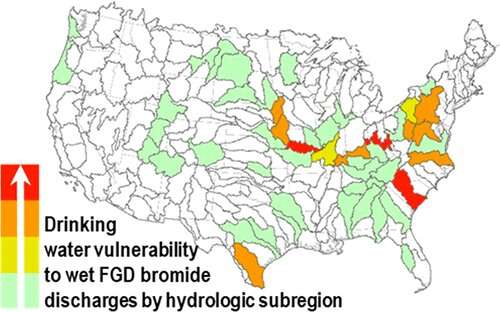Are coal-fired power plants affecting your drinking water?

When you get a drink of water from your fridge or sink, do you think about where that water came from? It has traveled through pipes from a water treatment plant where it underwent chemical processes to make it safe to drink. Chlorine is added to the water to eradicate harmful bacteria that cause illnesses like cholera, dysentery, and typhoid. But the chlorine can react with natural materials in the water, creating disinfection byproducts (DBPs) that can be harmful to people. Specifically, when bromide is present in the water from natural sources or from human activities, such as wastewater discharges at power plants, the disinfection byproducts formed are more toxic.
Jeanne VanBriesen, a professor of civil and environmental engineering and engineering and public policy at Carnegie Mellon University, and recent Ph.D. graduate Kelly Good have completed a study analyzing how bromide discharges from coal-fired power plants can affect drinking water across the United States.
"It's very complex because it depends on the choices that power plants make," said VanBriesen, who is also a fellow with the Scott Institute for Energy Innovation. "Each choice—often made for good reasons like controlling mercury, controlling other air pollutants, or reducing cost with a tax credit—affects whether bromide will be discharged, potentially affecting a drinking water plant."
The bromide found in coal usually leaves the power plant in exhaust gases via the stack. But if the power plant deploys a treatment technology to reduce sulfur dioxide emissions and prevent acid rain, it captures both sulfur dioxide and, incidentally, bromide. In this case the bromide is released into the river, where it can enter drinking water plants and cause increased DBP formation.
VanBriesen and Good began this study in 2015, looking at bromide in the Allegheny River Basin, which was affected by discharges from power plants as well as from treatment of oil and gas-associated wastewaters. To see if this problem was unique to the area, VanBriesen and Good studied bromide discharge from coal-fired power plants throughout Pennsylvania, demonstrating there were many drinking water plants that might be affected. The national study just published was the culmination of this analysis. It includes an analysis of the potential for each power plant to affect multiple drinking water plants.
"It also goes the other way: for each drinking water plant we evaluated vulnerability by identifying all the power plants that could be affecting it," said VanBriesen. "So that allows the drinking water plants to know where bromide might be coming from, and it allows the power plants to know if they may be having an unintended effect on drinking water. That means we can answer the question of, where will it be most impactful to control bromide discharges?"
The results could also help the EPA decide how to regulate power plant discharges, which are under review this year.
VanBriesen plans to continue this work with an even broader assessment of the costs and benefits of the different choices that are made at power plants. "We would like to understand how the choices to control air pollutants, and thus, reduce air quality-associated risk, affect the changes in risk from the bromide discharges. Balancing the benefits and the risks is something we always want to consider when we control environmental pollutants," said VanBriesen. "That's the next piece."
More information: Kelly D. Good et al. Coal-Fired Power Plant Wet Flue Gas Desulfurization Bromide Discharges to U.S. Watersheds and Their Contributions to Drinking Water Sources, Environmental Science & Technology (2018). DOI: 10.1021/acs.est.8b03036
Journal information: Environmental Science & Technology



















